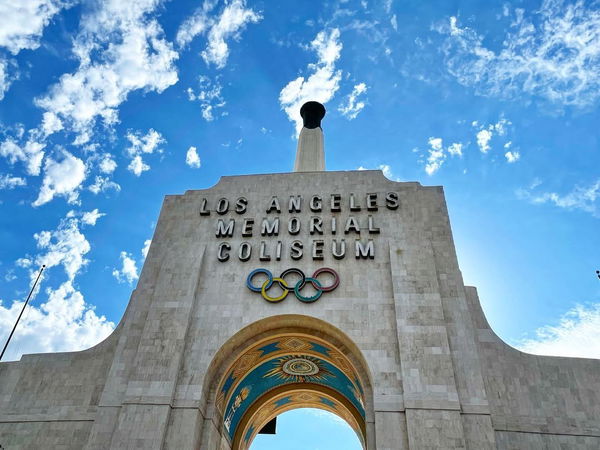
Imago
Credits: Instagram/@heysocalnews

Imago
Credits: Instagram/@heysocalnews
The Los Angeles Olympics of 2028 have long been projected as a showcase of American capability. But the pathway to the Games is proving far less orderly. With mounting concerns about wildfire preparedness, a $1 billion city deficit, and delayed infrastructure upgrades, local officials already face significant challenges. Yet these obstacles pale beside the growing alarm over one issue that could undermine the very essence of the Olympics: Whether international athletes and teams will even be allowed to enter the United States.
Watch What’s Trending Now!
While the International Olympic Committee awarded Los Angeles the Games in 2017 under a binding contract, the city’s obligations cannot guarantee global participation if federal travel policies prevent athletes from competing. Recent events suggest this risk is more than theoretical.
Visa complications have already disrupted major competitions in the United States, including the 2022 World Athletics Championships in Oregon, where hundreds of athletes from Africa, the Caribbean, and Asia struggled to obtain approval. Africa’s fastest man, Ferdinand Omanyala, was nearly forced to withdraw altogether, receiving his visa less than a day before the competition. As he explained at the time, “Visa challenges are faced by all Kenyans and people daily, in this case I was no different.” This reality now shadows the Olympics.
The U.S. system for P-1A sports visas can take weeks or even months, with little transparency or consistency across embassies. Coaches report that soccer teams from Cuba, Venezuela, and Senegal have already been denied entry for tournaments in 2025. The implications are severe. Truncated delegations in qualifying events of 2026 and 2027 would distort competition before the Games even begin. Olympic sponsors have privately acknowledged the problem, preparing duplicate campaigns in case their chosen athletes are absent.
Former Olympic champion Michael Johnson has described the handling of the Oregon visa delays as “pitiful and shameful,” adding that it had long been known that “US entry visa may be one of the most difficult and WA and the organizing committee didn’t get ahead of this?” His criticism highlights the contrast between the vision of universal representation and the reality of procedural bottlenecks. The perception that the United States cannot ensure timely access has fueled debate within sporting circles about whether Los Angeles is fully prepared for its responsibilities as host.

Imago
Credits: Instagram/@coheteboy
Congressional leaders have begun to intervene.
In August 2025, more than 50 representatives signed a letter urging Secretary of State Marco Rubio to streamline visa processing ahead of both the 2026 FIFA World Cup and the 2028 Olympics. Representative Sydney Kamlager-Dove, who sits on the House Foreign Affairs Committee, warned, “This is a real problem because it impacts attendance and it impacts economic activity.” The letter described the stakes as both financial and diplomatic, stressing that the United States must demonstrate reliability as the center of the global sports calendar.
For athletes, however, the matter is not abstract. Omanyala’s last-minute arrival in Eugene remains a cautionary tale of how fragile preparation can be when visas are delayed. Marathoner Aliphine Tuliamuk captured the broader frustration, observing, “Getting a US visa especially in Kenya right now is very very hard, in fact embassy appointments aren’t available till 2024.” Without systemic reform, competitors risk training for years only to be denied entry when it matters most.
The Los Angeles organizers continue to express confidence that the federal government will cooperate, but no formal exemption program has been enacted. The precedent from Tokyo 2021 shows that even a wave of domestic opposition cannot easily cancel an Olympics once the IOC has committed. Yet the greater threat for LA28 is not cancellation from within but a failure to uphold the principle of international inclusivity. Unless Washington can assure swift and equitable visa access, the Games risk becoming a diminished spectacle, remembered less for athletic achievement than for bureaucratic exclusion. Plus, strict US visa policies cast uncertainty over whether international spectators could attend the Los Angeles Olympics in 2028.
Foreign fans left in doubt as US visa rules cloud Los Angeles Olympics 2028
Foreign visitors found themselves facing difficult questions as Los Angeles prepares for the 2028 Olympic Games. The grand promise of a global celebration encountered uncertainty when the new immigration policies placed international fans in a markedly different category from athletes and officials. While competitors and accredited personnel were assured entry, ordinary spectators were left to contend with a patchwork of restrictions that threatened to limit their participation in one of the world’s most anticipated gatherings.
The State Department maintained a cautious line, advising, “We encourage prospective foreign travelers who will need US visas to travel to the 2028 Olympics to apply early.” Yet such encouragement came alongside measures that required some applicants to post bonds of up to $15,000 and restricted their entry to a handful of airports. More significantly, entire groups of potential visitors from countries under the travel ban were denied the opportunity to attend at all. For many hopeful fans, the policies created a gulf between the ideal of the Games as open to all and the reality of navigating barriers.
The administration’s determination to enforce these provisions raised doubts about how inclusive the Los Angeles Olympics could be for global audiences.
Citizens from nations under full bans, including Iran, Libya, and Yemen, were shut out entirely, while those from partially restricted countries faced arduous procedures. The contrast was clear: Athletes entered under exemptions and streamlined processes, while ordinary supporters were left with diminished prospects. As the State Department itself acknowledged, the travel and tourism sector supported nearly 10 million jobs, yet the rules stood to discourage precisely the kind of international spectators the Games had long relied upon.
The question remained whether the vision of a worldwide festival could withstand such limitations.
